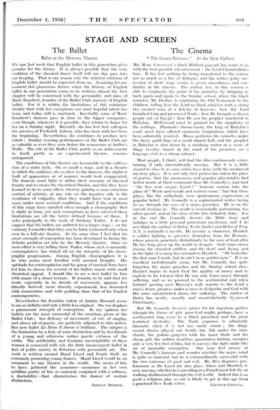The Cinema
Ms. MARC CONNELLY'S black Biblical pageant has conic to us with the best possible advertisement : the Lord Chamberlain's ban. It has lost nothing by being transferred to the screen. not so much as a line of dialogue, and the rather jerky suc- cession of short stage scenes is given smoothness and con- tinuity in the cinema. The author, too, in this version is able to emphasise the point of his narrative by bringing us back again and again to the Sunday school, where the black minister, Mr. Deshec, is explaining the Old Testament to the children. telling how the Lord (a black minister with a string tie) created man at a fish-fry in heaven ; how the Lord banished Cain and preserved Noah ; how He brought a chosen People out of Egypt ; how He saw his prophet murdered in Babylon. Hollywood must be praised for the simplicity of the settings. Pharaoh's throne-room, the king of Babylon's court must have offered enormous temptations which have been admirably resisted. Moses performs his miracles under the dusty guild flags of a small church hall, and the prophet in Babylon is shot down by a smirking waiter at a scene of dingy revelry, based, in the mind of the preacher, on it long-ago visit to a cheap cabaret.
Most people, I think, will find the film continuously enter- taining, if only intermittently moving. But it is a little absurd to class it. as some critics have done, with the mediaeval mystery plays. It is not only that pathos has taken the place of poetry, that the anonymous and popular playwrights had better words at their command than Mr. Connelly's, and that " the five cent seegar, Lawd ? " humour cannot take the place of " Wode and wynde and waiters wane," but that those plays, like the cathedrals, were spontaneous expressions of popular belief. Mr. Connelly is a sophisticated writer trying to see through the eyes of a negro preacher. He is on the outside looking in. The result is occasionally patronising, too Often quaint, and at the close of the film definitely false. For at the end Mr. Connelly deserts the Bible story and indulges in a little personal protestant mysticism, and I do not think the author of Daley, To the Ladies and Helen of Troy, N.Y. is naturally a mystic. He invents a character, Hezdrel, a soldier fighting to preserve Jerusalem from the Romans, whose prayers penetrate disturbingly to the ears of God after He has long given up the world in despair. God comes down among the smashed artillery and the dead and dying, and in the light of a camp fire encounters Hezdrel. " He looks like the first man I made, but he ain't in no garden now." It is an excellent melodramatic scene, but Mr. Connelly has quite forgotten the negro preacher and the Sunday school class. Hezdrel begins to teach God the quality of mercy and to explain to his Creator that He can only learn mercy through suffering, and so we proceed to the sentimental end when Gabriel, peering over Heaven's wall, reports to the Lord a man's weary progress under a cross to Golgotha and God with His arms outstretched shares the suffering. The author of Daley has neatly, smartly and unsatisfactorily by-passed Christianity.
But Mr. Connelly deserves praise for his ingenious pathos (though the theme of pity poor God might, perhaps, have a sentimental ring even to a black preacher) and his great technical dexterity. The Noah sequence is admirably dramatic when it is not too easily comic ; the dingy sexual drama played out beside the Ark under the rain- clouds, the jealous gangster with his razor blade and his cheap girl, the sudden heartless, passionless knifing, occupies only a very few feet of film, but it conveys the right snake-like air of incurable corruption. One may feel uneasy at Mr. Connelly's humour and wonder whether the negro mind is quite so material, but he is extraordinarily successful with the two extremes of good and evil. Mr. Rex Ingram's per- formance as De Lawd (he also plays Adam and Hezdrel) is very moving, whether he is presiding at a Paradisiacal fish-fry or walking disillusioned through the evil world. Indeed this is as good a religious play as one is likely to get in this age from




















































 Previous page
Previous page